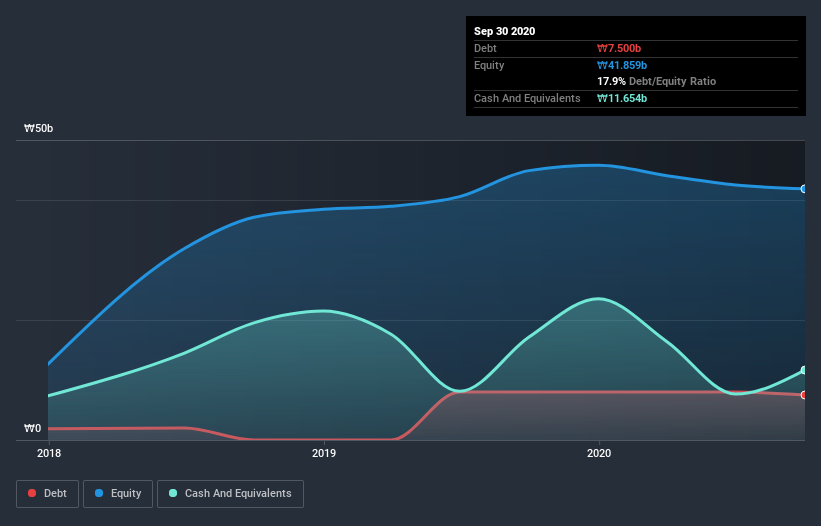David Iben put it well when he said, 'Volatility is not a risk we care about. What we care about is avoiding the permanent loss of capital.' So it seems the smart money knows that debt - which is usually involved in bankruptcies - is a very important factor, when you assess how risky a company is. We can see that Barrel Co., Ltd (KOSDAQ:267790) does use debt in its business. But is this debt a concern to shareholders?
When Is Debt A Problem?
Debt and other liabilities become risky for a business when it cannot easily fulfill those obligations, either with free cash flow or by raising capital at an attractive price. In the worst case scenario, a company can go bankrupt if it cannot pay its creditors. However, a more frequent (but still costly) occurrence is where a company must issue shares at bargain-basement prices, permanently diluting shareholders, just to shore up its balance sheet. By replacing dilution, though, debt can be an extremely good tool for businesses that need capital to invest in growth at high rates of return. The first step when considering a company's debt levels is to consider its cash and debt together.
View our latest analysis for Barrel
What Is Barrel's Net Debt?
As you can see below, Barrel had ₩7.50b of debt at September 2020, down from ₩8.00b a year prior. However, it does have ₩11.7b in cash offsetting this, leading to net cash of ₩4.15b.

How Healthy Is Barrel's Balance Sheet?
Zooming in on the latest balance sheet data, we can see that Barrel had liabilities of ₩4.06b due within 12 months and liabilities of ₩6.36b due beyond that. On the other hand, it had cash of ₩11.7b and ₩1.22b worth of receivables due within a year. So it actually has ₩2.45b more liquid assets than total liabilities.
This short term liquidity is a sign that Barrel could probably pay off its debt with ease, as its balance sheet is far from stretched. Succinctly put, Barrel boasts net cash, so it's fair to say it does not have a heavy debt load! There's no doubt that we learn most about debt from the balance sheet. But it is Barrel's earnings that will influence how the balance sheet holds up in the future. So when considering debt, it's definitely worth looking at the earnings trend. Click here for an interactive snapshot.
Over 12 months, Barrel made a loss at the EBIT level, and saw its revenue drop to ₩37b, which is a fall of 36%. To be frank that doesn't bode well.
So How Risky Is Barrel?
Statistically speaking companies that lose money are riskier than those that make money. And the fact is that over the last twelve months Barrel lost money at the earnings before interest and tax (EBIT) line. Indeed, in that time it burnt through ₩5.3b of cash and made a loss of ₩3.6b. Given it only has net cash of ₩4.15b, the company may need to raise more capital if it doesn't reach break-even soon. Even though its balance sheet seems sufficiently liquid, debt always makes us a little nervous if a company doesn't produce free cash flow regularly. The balance sheet is clearly the area to focus on when you are analysing debt. However, not all investment risk resides within the balance sheet - far from it. Be aware that Barrel is showing 2 warning signs in our investment analysis , and 1 of those is concerning...
If you're interested in investing in businesses that can grow profits without the burden of debt, then check out this free list of growing businesses that have net cash on the balance sheet.
If you decide to trade Barrel, use the lowest-cost* platform that is rated #1 Overall by Barron’s, Interactive Brokers. Trade stocks, options, futures, forex, bonds and funds on 135 markets, all from a single integrated account. Promoted
Valuation is complex, but we're here to simplify it.
Discover if Barrel might be undervalued or overvalued with our detailed analysis, featuring fair value estimates, potential risks, dividends, insider trades, and its financial condition.
Access Free AnalysisThis article by Simply Wall St is general in nature. It does not constitute a recommendation to buy or sell any stock, and does not take account of your objectives, or your financial situation. We aim to bring you long-term focused analysis driven by fundamental data. Note that our analysis may not factor in the latest price-sensitive company announcements or qualitative material. Simply Wall St has no position in any stocks mentioned.
*Interactive Brokers Rated Lowest Cost Broker by StockBrokers.com Annual Online Review 2020
Have feedback on this article? Concerned about the content? Get in touch with us directly. Alternatively, email editorial-team (at) simplywallst.com.
About KOSDAQ:A267790
Excellent balance sheet and good value.
Market Insights
Community Narratives




